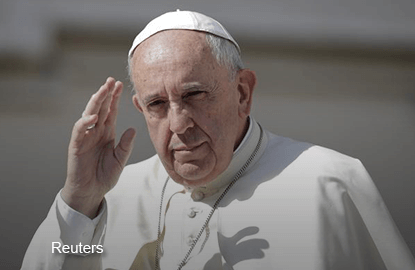
IT’S surprising to hear Pope Francis talk about the sanctity of worldly debts. After all, few can be more aware than the head of the Catholic Church of the many biblical texts that call for forgiveness of debts as well as of sins. In last week’s papal “Laudato Si” encyclical, however, the Pope says that sins against creation are very different from broken financial promises made between people.
Christian creditors are supposed to be generous to debtors. Jesus tells them as much by explaining that since all people are children of the same heavenly Father, the bonds of familial love take precedence over all other obligations. In more secular terms, that means our shared humanity brings an obligation to temper justice with mercy.
Modern secular societies tend to recognise that creditors and debtors operate in partnership. The strict terms of a contract, which call for payment to the last penny, are sometimes softened. The mix is good for the economy. There can be little productive borrowing in any society which allows lenders to wreak unlimited havoc on those who cannot pay up without great suffering.
It is hard to draw the right line between debt justice and debt forgiveness. The current debate on the Greek government’s obligations is typically difficult. In that case, creditors and debtors both basically accept the need to forgive and start again. But there are problems, because both sides also insist on correcting at least part of an outstanding injustice.
“Laudato Si” is not directed at Greece, or any other squabble among people who are already well off by historical and global standards. The pontiff wants to draw attention to a different order of ethical obligation, the moral debt of the rich to the poor.
The logic behind what Catholics call the “preferential option for the poor” is fairly straightforward. It starts with the recognition that all people and nations are members of the one human family. Everyone — everywhere in the world, through all of history — is ultimately responsible for everyone else. The obligation is universal and implies a preference to those most in need. That is because the poor gain most from generosity and suffer most from hard-heartedness.
In other words, wealth and privilege always come with a debt to the poor. The payment of this moral debt takes various forms. It is expressed in personal attitudes, corporate strategies and government policies. The obligation to help the poor also comes before securing ever more comfortable first-world lifestyles, shareholder returns and selfish nationalism.
The moral debt of the rich is honoured with a ready willingness to forgive the poor’s financial debts. Thoughtful generosity can reduce the outstanding balance. But these moral debts cannot be written off. People cannot forgive and the Pope clearly does not think God is willing to look the other way.
In the encyclical, the Pope adds an imaginative twist. He talks of the debts of all humanity to all of the natural world in terms of the preferential option for the poor. Inspired by his namesake St Francis of Assisi, the Pope explains that nature suffers from a weakness that the poor also have — it cannot resist human aggression and depravity. In the face of this helplessness, rich humanity owes nature what he calls an ecological debt, the obligation to be good stewards of creation. The debt can only be honoured by treating the physical world as the human community’s shared responsibility.
With great emotion, the Pope says that global environmental imbalance of payments is shocking. The relative ease with which pollution was significantly reduced in developed countries over the last half-century contrasts starkly with the environmental carelessness that has persisted elsewhere.
As the Pope points out, poor lands suffer most from non-payment of ecological debts. Many of them are plagued with dirty water, toxic wastes, blighted cities and destructive mines. The rich suffer relatively little, but their “throwaway culture”, as the Pope calls it, is a big part of the problem. Man-made global warming, accepted by the Pope as scientifically demonstrated, fits right in. The rich are largely responsible, but they expect the poor to take a disproportionate share of the pain required to reverse the trend.
Those prone to righteousness might expect careless miners, farmers and industrialists, as well as insatiably greedy consumers, to get their comeuppance in desolation and misery. Mercifully, nature has up to now been a generous creditor. It is slow to punish and fast to reconcile. But the largest ecological debtors — everyone in industrial economies —should not use this forbearance to excuse inaction, any more than they should ignore the obligation to the poor because they are too weak to cause much trouble.
Justice, as the Pope says, requires unceasing attention to “both the cry of the earth and the cry of the poor.” Some debts last forever. — Reuters
This article first appeared in The Edge Financial Daily, on July 1, 2015.